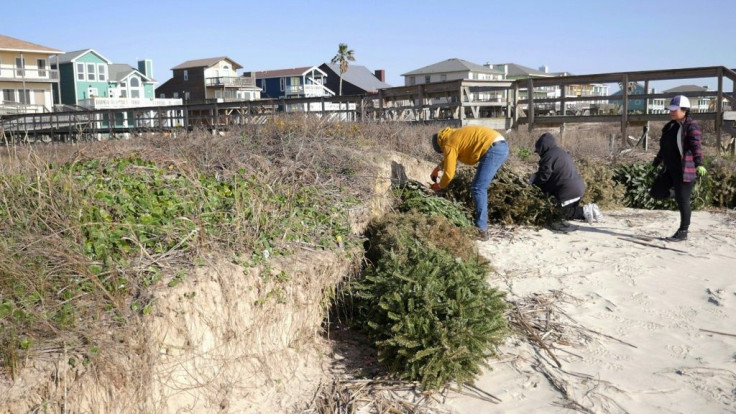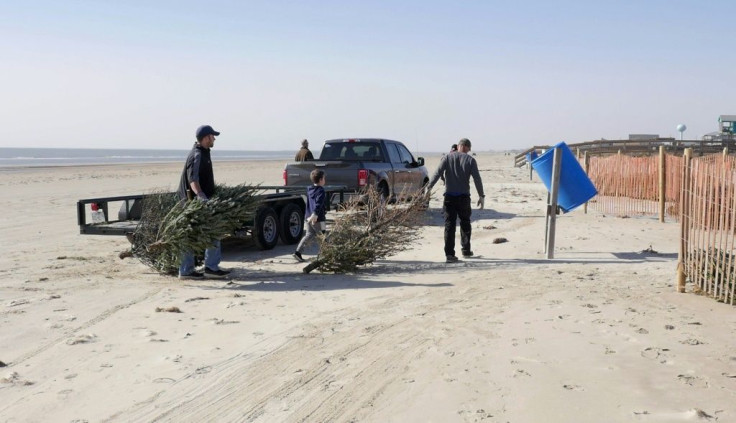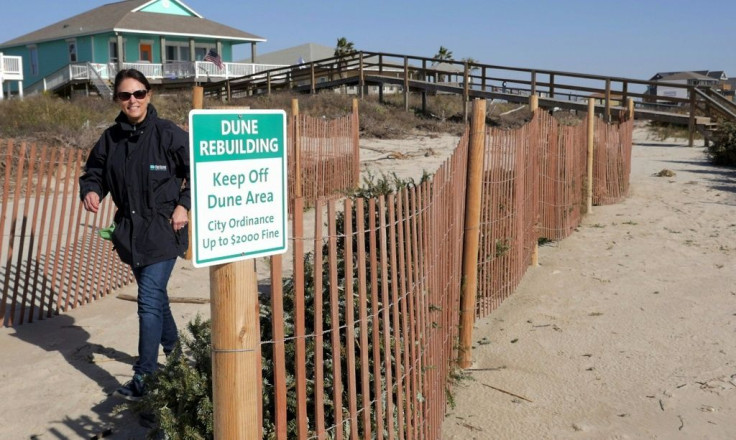Texas Coast Uses Christmas Trees To Rebuild Storm-ravaged Dunes
Toni Capretta stands on a patch of Texas's Gulf coast where just seven months earlier the dunes were nearly her height. Now they are gone.
Her town of Surfside Beach comes alive during the summer months, when Texans flock to the coast, but the landscape's saving grace is straight out of a winter wonderland: the beloved Christmas tree.
The recycled evergreens are used to construct new dune barriers to protect the sensitive area from the ravages of powerful storms.

Every winter, the Save our Beach association, which Capretta heads, gathers hundreds of volunteers to rebuild its dunes -- much of which was washed back into the ocean by last year's record storm season.
For the inhabitants of nearby Lake Jackson and populous Houston a bit farther inland, the 25 miles (40 kilometers) of beaches in Brazoria County -- which includes Surfside Beach -- offer a welcome haven for fishing and sun-bathing.
The Gulf dunes also provide refuge to hundreds of species of birds, to the sea turtles that lay their eggs there, and even at times to alligators.
On a recent county-sponsored "Dunes Day," Capretta was busily dispensing advice to the volunteers who had come to renew their defense of the sandy coastline.

Hunched over or kneeling, they used untreated pine stakes and natural fiber twine to fasten some 3,000 donated Christmas trees firmly to the sand.

After a few months, wind-blown sand begins to pile up, trapped by the branches and needles of the recycled trees, until eventually they are entirely covered over.
"It's kind of a perfect fit," said Bryan Frazier, the parks director of Brazoria County that has supervised this operation since 1978.
"Over time, once the sand builds up on top of those natural Christmas trees, those Christmas trees will deteriorate and actually fertilize some of the vegetation that will grow on top of it."
The technique works so well that the county regularly fields requests for information, as it did in 2012, when Superstorm Sandy ravaged the faraway Atlantic coasts of New Jersey and New York.

Coastal erosion is a particular problem here.
Between the powerful currents of the Gulf of Mexico and the mouths of two rivers, the coast features "some of the most rapidly depleting shoreline anywhere in Texas," Frazier said.
Last year, the Christmas tree barriers built by volunteers helped protect homes and the shore road during a particularly violent storm season.
"The 2020 Atlantic hurricane season was extremely active," said Phil Klotzbach, an atmospheric researcher at Colorado State University.
"The season had 30 named storms -- the most on record for an Atlantic hurricane season."
The coast around Surfside Beach had not seen such severe damage since 2008, with Hurricane Ike. But because no hurricane passed directly over, it received no federal aid.
"The storms were not direct hits," said Capretta. "When they are direct hits, you get a lot of government funding."
Still, the coast here was ravaged by sea surges from four powerful storms.
It began in early June, when Tropical Storm Cristobal roared through the Gulf of Mexico before heading up the Mississippi Valley river.
In late August, Hurricane Laura struck Florida and Louisiana after claiming dozens of lives in Haiti and the Dominican Republic.
By mid-September, meteorologists had run through their usual list of storm names and had to turn to the Greek alphabet. And late that month, tropical storm Beta rumbled through the Gulf before making landfall 55 miles from Surfside Beach.
The devastating storm series ended in October with Hurricane Delta.
© Copyright AFP {{Year}}. All rights reserved.





















